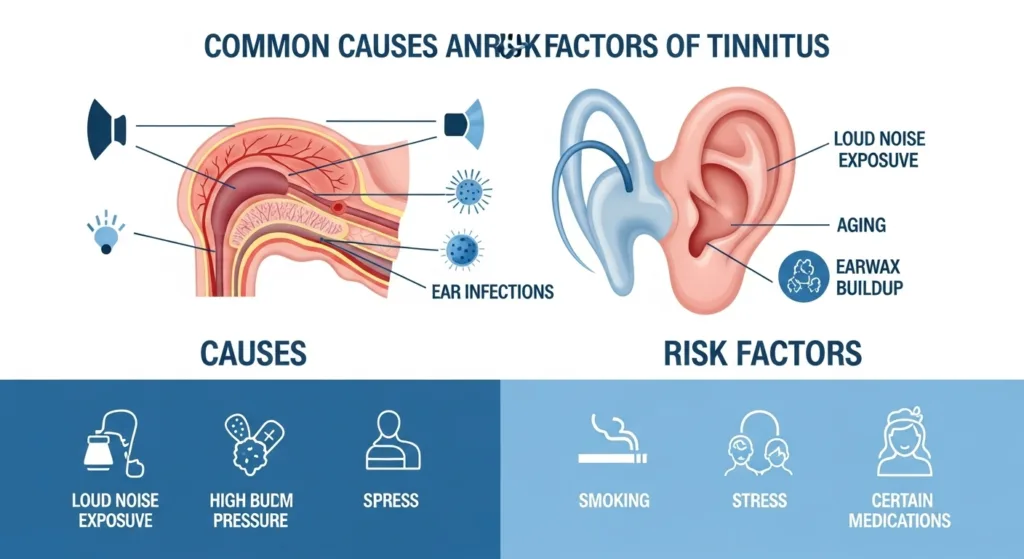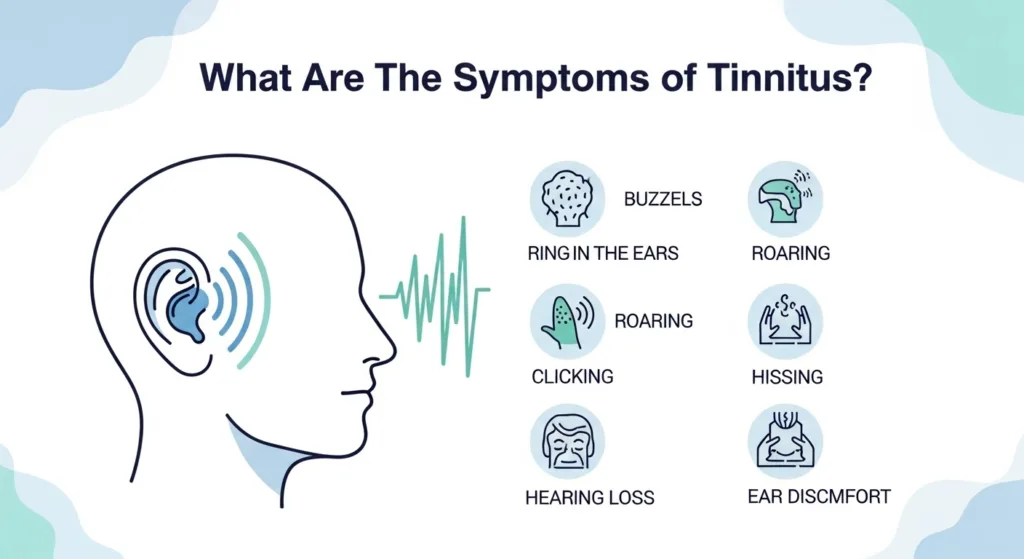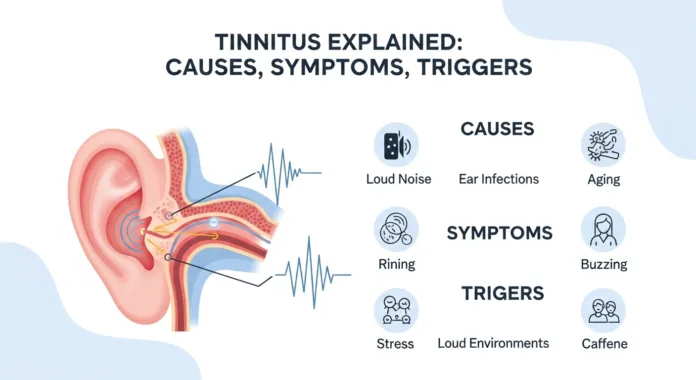What Is Tinnitus?
Tinnitus is the sensation of hearing sounds in your ears, usually ringing, whoozing, or hissing, not caused by an outside sound source. Around 15%-20% of people, usually older adults, experience this. And although it is not harmful, Tinnitus can be bothersome, long-lasting, and can hinder someone’s ability to fall asleep or concentrate.
It is an indicator, not an ailment. It is often associated with age-related hearing loss, damage to the eardrum, exposure to trauma from louder-than-normal sounds, or issues with blood flow. Though there is no adequate one-size-fits-all treatment, it is often possible to reduce the intensity that allows one to cope by managing the underlying issue, sound-based therapy, or changing behaviours.
How To Pronounce Tinnitus Correctly?
There are two main ways to pronounce tinnitus:
- TIN-ih-tus (sounds like “arthritis”) is the one that most healthcare providers in the US use.
- tin-NY-tus (sounds like “excite us”) – This is also okay and can be heard in different places or when people are just talking.
There is no “wrong” way; either way is fine. The different ways of saying things mostly depend on where you are and how you speak.
Common Causes and Risk Factors Of Tinnitus

There are various causes that can cause tinnitus, like:
1. Hearing Loss from Ageing (Presbycusis)
Age related hearing loss, also referred to as presbycusis – happens slowly due to damage in the inner ear, causing not only ringing in the ears, but has also been determined to have unclear sounds.
2. Exposure to Loud Noise
Regular exposure to loud noises, this can be music, machinery, traffic, etc., can damage the nerves in the inner ear that result in Tinnitus and permanent hearing issues that will be permanent.
3. Earwax Blockage
Excessive earwax can obstruct the ear passage, causing pressure and hindering hearing, frequently leading to short-term tinnitus.
4. Middle Or Inner Ear Infections
Ear infections, whether in the middle or inner ear, can lead to swelling and fluid accumulation, which interferes with how sounds are processed and may cause temporary or lasting tinnitus.
5. Ototoxic Medications
Ototoxic drugs, like some antibiotics, cancer-fighting medications, and strong doses of aspirin, can harm the inner ear, causing or intensifying tinnitus.
6. High Blood Pressure Or Vascular Issues
Issues with high blood pressure and blood vessels can impact the blood supply to the inner ear. This can either cause or worsen tinnitus, which can sound like a pulsing or steady noise.
7. Injury to the Head or Neck
Injuries to the head or neck may affect nerves, affect the blood supply to the inner ear. This can lead to turning on tinnitus or worsening existing tinnitus, which can sound like a pulsating or constant sound.
8. Disorders of the Temporomandibular Joint (TMJ)
Disorders of the temporomandibular joint can involve the muscles and nerves located near the ear(s) and may result in pain in the jaw, clicking or popping when opening or closing the mouth and noise within the ear(s).
9. Sinus and Congestion or Infection
Sinus congestion or infection can produce pressure and inflammation around the ear(s) and impact hearing and, consequently, may temporarily cause tinnitus.
10. High Stress And Anxiety Level
Persistent stress and worry may interfere with how the brain processes sounds and also increase muscle tightness, which in turn could worsen or cause tinnitus symptoms.
Can High Blood Pressure Cause Tinnitus?
High blood pressure can cause or worsen tinnitus. High blood pressure causes increased blood flow force in the inner ear, which can result in pulsing sound or ringing sound called pulsatile tinnitus. Poor circulation and pressure on auditory nerves may cause or amplify symptoms of tinnitus. By controlling blood pressure, you can decrease the chances of having tinnitus, or if you are already suffering from tinnitus, it will decrease the severity or intensity of that tinnitus.
Can Sinus Cause Tinnitus?
Yes, a sinus infection can cause tinnitus. When the sinuses are inflamed or congested, it affects your ears by creating pressure and affecting the Eustachian tube. The imbalance in ear pressure can lead to ringing, buzzing or whooshing sounds in the ears.
Can Depression Cause Tinnitus?
Depression may contribute to tinnitus in two ways, first, by increasing the perception of the ringing in the ear, and second, a lowering the ability to cope with it. The shared brain pathways that are involved with mood regulation can worsen your symptoms of tinnitus.
Tinnitus-related distress may also produce or exacerbate depression in some cases, which is why early diagnosis and treatment can aid in symptom management. Overall, the relationship between tinnitus and depression ought to be understood, as they can interact with each other.
When Does Tinnitus Start In Pregnancy?
Tinnitus, a ringing, buzzing, or whooshing sound in the ears, can start at any point in pregnancy but is mostly seen in the second or third trimester. Tinnitus may be caused in pregnancy by hormonal changes, increased blood circulation or increases in blood pressure, which can affect how the ear works.
Many women experience:
- Sounds that are perceived in the ear(s): buzzing, ringing or whooshing.
- Symptoms are getting worse at night or when flat.
- Feeling more sensitive to sound.
Reason:
- Both estrogen and progesterone hormones impact the functioning of the inner ear.
- Blood vessel changes can impact hearing for women.
- Stress and fatigue can trigger or make symptoms worse.
If tinnitus appears suddenly or is accompanied by symptoms like severe headaches, vision changes, or high blood pressure, consult your doctor immediately; it could be a sign of preeclampsia.
What Are The Symptoms Of Tinnitus?

Some common symptoms of tinnitus are:
- Ringing in ears- either a continuous or intermittent high-pitched sound.
- Buzzing- a low or high frequency buzzing noise that has no sound source.
- Hissing or static sound- low frequency, or more like a deep resonating hum.
- Clicking or Pulsing- periodic, clicking or pulsing, rhythmic sound similar to your pulse.
- Roaring or Whooshing sound- sounds like crashing waves or wind.
- Beeping or chirping- short, repeating beeping or an electronic sound.
- Feeling of fullness in your ear- ear feels like it has pressure or is plugged.
- Difficulty hearing- ability or trouble concentrating on outside sound or in following a conversation.
- Irritability or Fatigue- due to constant interruption of the sound.
- Difficulty sleeping and concentrating- usually getting worse when there is little to no background noise that is not distracting
Tinnitus & Nutrient Deficiencies
Tinnitus can sometimes indicate that your body is deficient in nutrients. Vitamin B12, magnesium, zinc, or iron deficiencies can negatively affect how your auditory nerves and inner ear work. The body needs these nutrients to send nerve signals, circulate blood, and repair cells.
When your diet does not have enough of these nutrients, your risk of experiencing tinnitus can be higher. For example, vitamin B12 supports nerve health; magnesium calms nerve activity; zinc supports cochlear function; and iron moves oxygen to the cells in the ear. Restoring these nutrients via food or supplements may help to decrease the volume of tinnitus as time goes on.
1. How much vitamin B12 is needed for tinnitus?
Although there is no recommended dose of vitamin B12 for the treatment of tinnitus specifically, many experts suggest doses ranging from 500 mcg to 1,000 mcg daily, especially for those patients with diagnosed deficiencies. This will help to replenish B12 stores, maintain and protect the health of the nerves, and increase blood flow to the inner ear, which may alter the symptoms of tinnitus.
Individuals with low B12—vegetarians, vegans, elderly persons, and others with absorption issues—are most likely to benefit from vitamin B12 supplementation. It is best to have your B12 levels tested before using any supplemental form of B12 and consult your doctor as to the most appropriate dose and delivery method (oral tablets versus injections) that works for you.
2. Can magnesium help with tinnitus?
Yes, magnesium is probably a useful supplement in alleviating tinnitus, especially if related to exposure to loud noise or stress. Magnesium improves nerve function, protects inner ear hair cells from degeneration, and improves blood flow and circulation, all of which can affect tinnitus.
Studies have found that a lack of magnesium can exacerbate tinnitus and increase sensitivity to loud noises. Supplementing with 200 – 400 mg of magnesium daily (using magnesium glycinate or magnesium citrate) may help to reduce the ringing
in your ears, but be sure to speak with your healthcare provider first. This is especially important if you have kidney problems or if you are on medications.
Daily Habits and Their Effect on Tinnitus
Tinnitus, the continuous ringing, buzzing, or hissing in your ears, can be influenced by several daily habits. Tinnitus can be irritating, while there may be no cure for it, making some changes in your daily routine can minimise its effect.
1. Use Of Smoking And Nicotine
Nicotine slows down blood flow to parts of the inner ear and causes damage to the delicate auditory nerves. Many smokers report increasing their tinnitus symptoms because nicotine decreases oxygen and nutrient delivery to the structures of the ear.
2. Sleep Quality Or Poor Sleep
Disrupted sleep, insomnia, or irregular sleep schedules can lead to fatigue, anxiety, and worsening of tinnitus due to increased sensitivity. A good night’s sleep reduces ringing brain activity, allowing the brain to dampen ringing sounds in the background.
3. Frequent Exposure To Loud Sounds
The hair cells in the ear can be damaged by wearing headphones with high volume or working in noisy places (construction sites, concerts right next to the speaker, or factories), and not using hearing protection. Damage to the hair cells is one of the most common causes of hearing loss and tinnitus.
4. High Salt Intake
Salt contributes to higher blood pressure, which directly increases blood flow rate, which can lead to circulation problems, including blood supply to the ears. In individuals who are suffering from tinnitus because of Meniere’s disease or vascular ear conditions, high salt intake can worsen their condition.
5. Lack of Nutrition
Low levels of nutrition, such as magnesium, vitamin B12, or zinc, can lead to nerve dysfunction and hearing issues. Healthy eating improves your overall health and supports inner ear function, and lowers the chances of tinnitus-induced factors.
6. Alcohol Consumption
Alcohol can alter blood vessel dilation, blood pressure, and hydration, and all can impact ear function. Some people report a worsening of their tinnitus after drinking alcohol, particularly later in the day, when the vasodilation and effect on the nervous system have led to changes in blood flow and the tinnitus itself.
7. Heightened stress and worry
Stress does not create tinnitus, but it can increase the volume of your symptoms and increase the distractions that keep you from ignoring them. Chronic stress can hold a fight or flight response in your brain, which may create sound.
Can caffeine affect tinnitus?
Caffeine can affect tinnitus symptoms, although individual reactions differ. For some individuals, caffeine will come from coffee, energy drinks, or tea, and relatively high doses of caffeine may increase the ringing due to overstimulation of the nervous system.
For others, moderate intake of caffeine (like 2-3 cups per day) resulted in no negative effects in tinnitus.
Why Is Tinnitus Worse At Night?
Tinnitus is very noticeably intense at night because there is no background noise, such as conversations and other noises that would normally mask the tinnitus. When things are quiet in the night or you try to sleep, your brain shifts from processing all the background noise to focusing on internal sounds. As a result, the uneven ringing or buzzing seems louder at night.
You may feel the stress, anxiety, or fatigue you have built up throughout the day, and this may contribute to an increased sensitivity to tinnitus and negatively impact your sleep and comfort at night.
Tinnitus linked with serious health conditions
Persistent ear noises may signal deeper health issues, making it crucial not to ignore ongoing or worsening symptoms.
1. Hearing Loss
One of the most frequently reported conditions to occur with tinnitus is typical sensorineural hearing loss. If there is damage to the inner ear hair cells, it is possible that the brain can hijack inner ear sensations to create phantom sounds, which are otherwise referred to as tinnitus. Many individuals with age-related decline in hearing will notice tinnitus as a reason for their difficulty hearing or an early indication of the hearing impairment.
2. High blood pressure / Hypertension
Increased blood pressure can increase the exertion on blood vessels already close to the inner ear, and can amplify the processes you experience sounds generated within your body, for example, ringing or pulsing. People who experience pulsatile tinnitus will experience the sound of tinnitus pulsating in time with their heart – this could also be a warning sign of a vascular issue.
3. Cardiovascular disease
Tinnitus may be attributed to arteriosclerosis or the narrowing of blood vessels, which can limit healthy blood flow to the ear. This can increase the severity of tinnitus, especially when engaging in any physical exertion or stress.
4. Thyroid Dysfunction
Both hyperthyroidism and hypothyroidism may have an effect on the auditory system. Changes in thyroid hormone levels can confuse the body’s nervous and circulatory systems and result in the analysis, exacerbation, or creation of tinnitus.
5. Meniere’s Disease
This disorder of the inner ear is characterized by vertigo, hearing loss and tinnitus symptoms. It is believed to be caused by a fluctuation of fluids in the inner ear. Tinnitus usually presents first.
6. Diabetes
Diabetes can put individuals at higher risk for nerve damage, and that could include damage to the auditory nerve. Diabetic neuropathy may have caused damage to the hearing and/or worsen tinnitus from poor blood sugar control.
7. Temporomandibular Joint Disorders (TMJ)
The temporomandibular joint (TMJ) is right next to the ears. Misalignment or abnormal function of the TMJ can cause referred pain and auditory symptoms. Many people suffering from TMJ disorders experience tinnitus, jaw pain, and clicking simultaneously.
Is pulsatile tinnitus dangerous?
Unlike regular tinnitus, pulsatile tinnitus sounds like a heartbeat or pulsing in the ear. While it is sometimes caused by non-serious issues (for example, stress, hypertension), it can also be indicative of serious problems such as vascular disease, vascular tumours, or vascular problems near the head. If you hear this sound, you should see a doctor to rule out any health issues.
Can Tinnitus Cause Dementia?
Tinnitus does not cause dementia, but tinnitus may contribute to cognitive problems over time. Specifically, tinnitus often results in stress, poor sleep quality, and impaired attention and concentration, which may contribute to brain health. Furthermore, tinnitus is most commonly associated with hearing loss – a direct risk factor for dementia.
How Does Tinnitus From High Blood Pressure Sound Like?
Tinnitus from high blood pressure regularly appears as a pulsing or whooshing loud noise. This type of tinnitus is called pulsatile tinnitus, and it usually matches your heartbeat and may be even more pronounced when lying down or at times of quiet. This type of tinnitus happens when there is increased blood flow near the ears and may be related to some type of vascular issue.
Tips For Managing Tinnitus Symptoms Naturally
- Limit caffeine, alcohol, and nicotine intake.
- Avoid exposure to loud noises and use ear protection when needed.
- Practice some meditation and other relaxation techniques.
- Have a proper and restful sleep.
- Stay physically active to improve blood circulation.
- Eat a balanced diet rich that are beneficial for ear health.
When To Seek Medical Help?
- If the sound is coming from one ear (unilateral tinnitus) and you have symptoms of dizziness, vertigo, or issues with balance
- If you have hearing loss, ear pain, along with the ringing
- If it is a pulsatile tinnitus (sounds like a heartbeat)
- If it affects daily life, sleep, or focusing
- If you have a history of any head or neck trauma
Conclusion
Approaching tinnitus management is a multifactorial process that includes, but is not limited to, lifestyle change, sound therapy, and guidance from a qualified health professional. While it may not always be possible to eliminate tinnitus, it is helpful to understand what made you develop tinnitus-whether from exposure to noise, age, hypertension, or another reason, including an underlying vascular or neurological condition- so you can narrow down your options as you go through treatment. Thankfully, if managed appropriately, we can mitigate the effects of tinnitus on our lives, thus enhancing our comfort and quality of life.
Key Causes And Triggers
- Prolonged exposure to loud noise
- Age-related hearing loss
- Earwax buildup
- High blood pressure
- Cardiovascular issues
- Stress, anxiety, and sleep disorders
- Certain medications (e.g, antibiotics, aspirin, diuretics)
- Temporomandibular joint disorders
- Head or neck injuries
- Vascular abnormalities near the ear
- Neurological disorders like multiple sclerosis or acoustic neuroma

